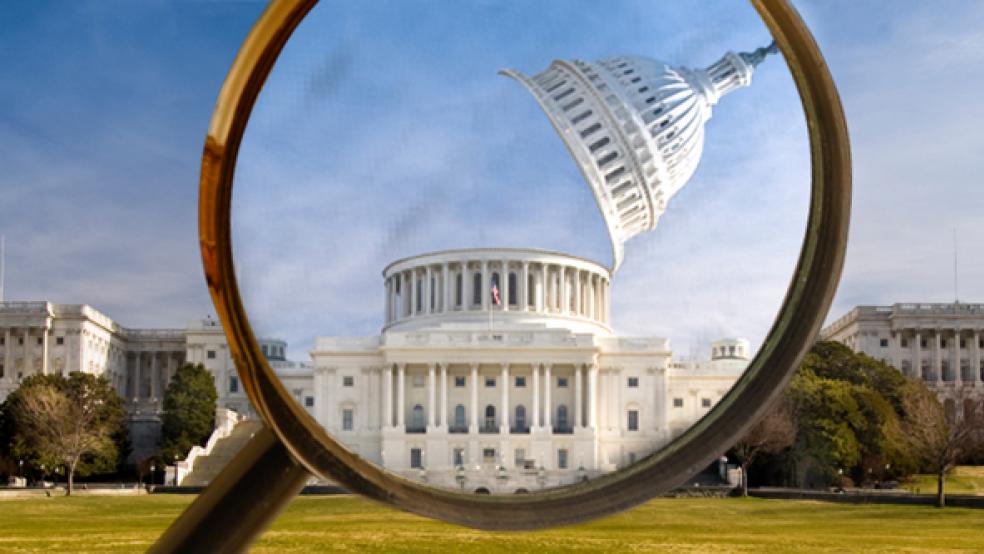Undeterred by a new poll indicating a decline in President Obama's approval rating, Republicans, once sanguine about a presidential victory, are rethinking their strategy and taking aim at Congress.
Just eight months ago, Republicans were squarely focused on moving one of their own into the White House, confident that President Obama’s dismal approval ratings lent them a sure shot at the presidency. But now, as a caustic nomination fight drags on and a slowly brightening economy boosts Obama’s prospects for reelection, Republicans are realizing that a White House win is not a slam dunk.
As a result, Republican strategists and funders are shifting their gaze to House and Senate campaigns, hopeful that even if Obama wins, Republican majorities in one or both Houses of Congress will force him into a legislative corner.
“Based on what we see today, there’s reason not to have a high degree of confidence that we can defeat Obama,” said Republican strategist Matt Mackowiak. But ousting Obama from office is not Republicans’ only path to legislative victory, he said. “There’s a calculation that a lot of folks are making that the general is not shaping up the way a lot of people want it to, and we have to make sure at a minimum we have at least one branch of government.”
Conservative commentator George Will instructed Republicans in a recent column to “take stock of reality” and pursue the “much more attainable” goals of keeping control of the House and capturing a majority in the Senate. Last week’s announcement that Republican Maine Sen. Olympia Snowe would not seek another term—leaving that seat vulnerable to a Democrat -- added more pressure to Republicans to defend their congressional presence.
Former Massachusetts Governor Mitt Romney will most likely clinch the GOP presidential nomination, after he won six of the 10 Super Tuesday primaries last week, driving his delegate count up to 454 of the 1,144 delegates needed to secure a spot on the ticket. That compares to former Pennsylvania Sen. Rich Santorum with 217, former House Speaker Newt Gingrich with 107 and Congressman Ron Paul with 47.
The Washington Post/ABC News poll numbers out today show Obama and Romney in a statistical tie among registered voters, with Romney leading Obama 49 percent to Obama’s 47 percent. This follows the same poll last month, which showed Obama leading Romney 51 percent to 45 percent.
Despite his lead, Romney has struggled to emerge as a frontrunner, unable to rope in the party’s conservative base and to connect with rank-and-file voters. Months of vitriolic attacks from Santorum and Gingrich that Romney lacks true conservative credentials and has flip-flopped on his health care and abortion platforms have not helped his cause, either.
“Last year, there was still hope that they [Republicans] could get somebody they could really fall in love with—they believed that Obama was just in terrible shape, would not be able to recapture his mojo, and they’d have a lot of opportunity to sift through their candidates and pick someone who would meet their tests,” said Norm Ornstein, a resident scholar at The American Enterprise Institute. “Now, we’re in a very different place and holding the House and winning the Senate are very high priorities.”
One group that is largely focusing its campaign war chest on congressional races is Freedomworks, an influential conservative group allied with the Tea Party and led by former longtime House Majority Leader Dick Armey. “Our notion is that we build a legislative fence around the president with energetic conservative policy innovators,” Armey, told The Fiscal Times. “Then the president, if he’s a Republican, is fenced into these policy initiatives and if Obama survives, he’s fenced up. “
Armey says he’s less than enchanted with the GOP presidential field, even though he still expects a Republican to land in the White House. “Am I supposed to get excited over candidate A’s beef with candidate B? Why doesn’t either one of them give me a policy recommendation?”
Armey also says he has zero concern that his organization’s lack of money flowing to the presidential race will hurt the outcome. “If we have the strong candidates that can inspire excitement from the grassroots in our House and Senate Candidates, that will actually help drive the presidential race from the bottom up.”
However, some Republican strategists say that type of either-or approach could backfire. Not making a strong play for the Oval Office could breed disaster for the GOP’s Senate race prospects, said Ford O’Connell, a Republican strategist and chairman of CivicForumPAC. “Since 1980, in most tight Senate races, the party that wins at the top of the ticket has dragged the Senate with it,” O’Connell said. “So even if the task of defeating President Obama has gotten harder, Republicans need to have their fight up for this one. They won’t win the Senate without it.”





